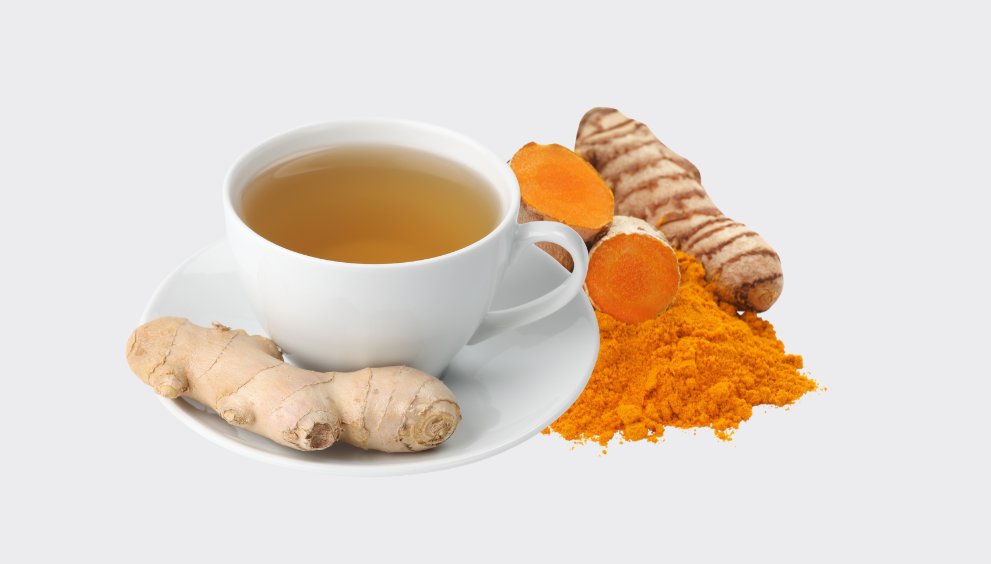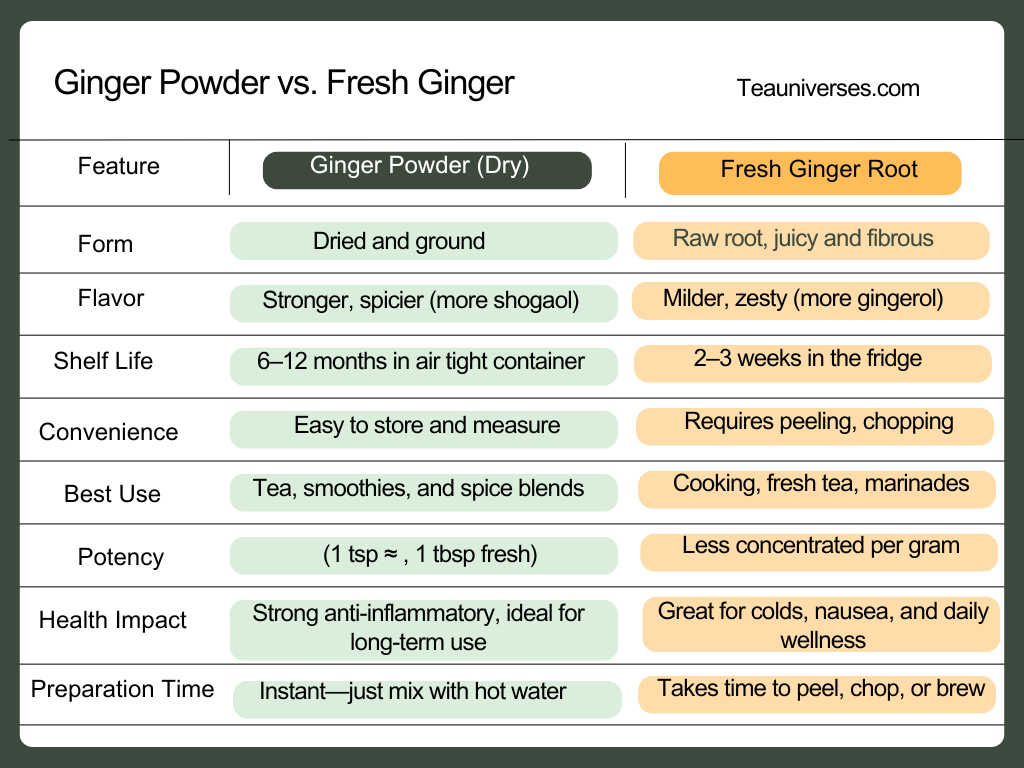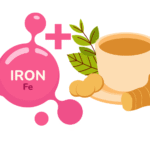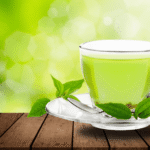Learn how to make powdered ginger tea at home for detox, digestion, and weight loss. Quick recipe, health benefits, and daily use tips included. Looking for a fast, potent, and travel-friendly way to enjoy the benefits of ginger tea? Powdered ginger tea could be your new go-to solution. If you want to boost metabolism, fight bloat, or support detox, this concentrated version offers all the wellness benefits.
Additionally, it saves you time by eliminating the need to slice fresh ginger. In this article, you’ll discover how to make powdered ginger tea. You’ll also learn the best time to drink it and how to boost its fat-burning and digestion benefits. Additionally, we’ll share valuable tips to help you avoid common mistakes and maximise the benefits of every cup. Let’s get started!
Quick Answer: Why Use Powdered Ginger for Tea?
Ginger powder offers a convenient way to enjoy ginger tea, eliminating the need to peel or chop the ginger. It’s easy to carry and prepare in seconds, making it ideal for busy people and those looking to detox and lose weight. It also retains most of ginger’s anti-inflammatory and metabolism-boosting benefits.
What Is Powdered Ginger Tea?
Powdered ginger tea is made by brewing hot water with dried, ground ginger root. This powder is fine and spice-like. It’s often used in cooking and herbal remedies. Fresh ginger needs peeling and chopping. It also requires longer steeping. This makes it more complex to use. Powdered ginger is simpler, so it’s a popular choice for quick health boosts.
While fresh ginger tea offers a cleaner, slightly citrusy taste, powdered ginger tea tends to be bolder, spicier, and more intense. It’s perfect for those who want a stronger flavour and faster prep time.
Read More: Fresh vs. Powdered Ginger Tea – What’s Better?
How to Make Powdered Ginger Tea at Home
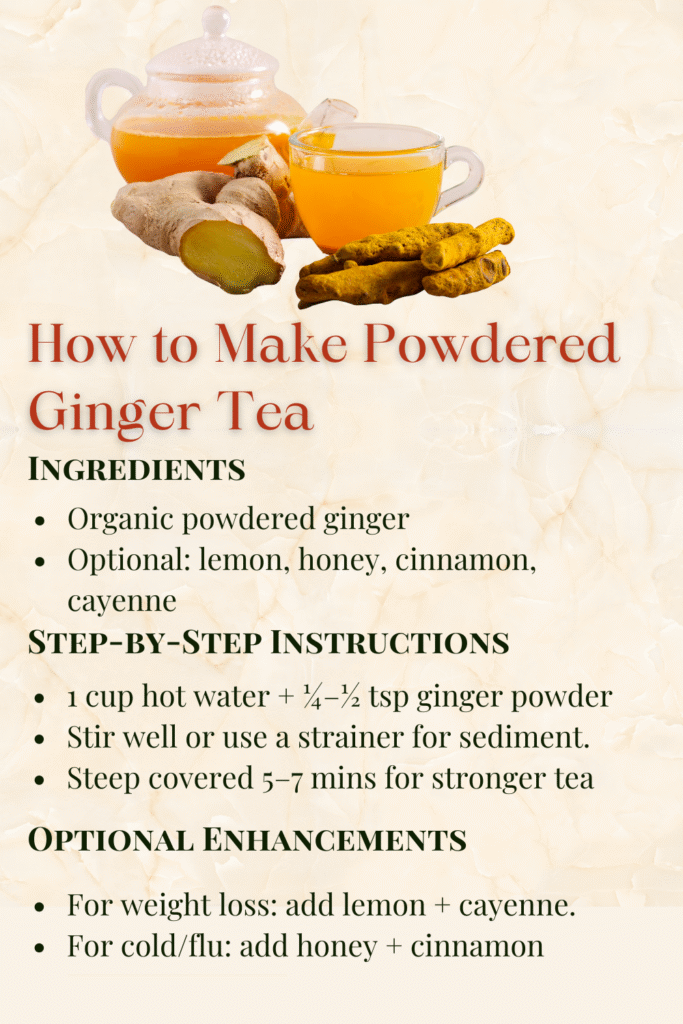
You can watch this for more detail.
Ginger Powder vs. Fresh Ginger: Key Differences
Best Time to Drink Powdered Ginger Tea
Morning:
You should start your metabolism and boost natural energy levels with a warm cup of powdered ginger tea. Its thermogenic properties help the body burn more calories throughout the day, making it an ideal choice for weight loss and fitness.
Pre-meal:
Drinking ginger tea 15–30 minutes before meals can help improve digestion. It achieves this by enhancing the production of gastric juice and bile. It helps stop bloating, indigestion, and sluggishness. This is especially helpful after big or protein-heavy meals.
Evening
Add lemon or peppermint for a soothing bedtime tea. Ginger helps relieve gas and cramping, promoting restful sleep. But ensure you’re not too sensitive to its warming effect.
When to Avoid:
Skip it late at night if you’re prone to heartburn or acid reflux, as ginger’s spicy heat can sometimes worsen symptoms in sensitive individuals.
Health Benefits of Powdered Ginger Tea
-
Boosts Digestion & Metabolism
Powdered ginger tea boosts digestive enzymes and bile. This helps your body break down food better. It also reduces bloating, gas, and indigestion, making it a go-to remedy for post-meal relief and metabolic support.
-
Supports Weight Loss
Thanks to its thermogenic properties, ginger helps increase calorie burn and suppress appetite. Gingerol and shogaol boost fat metabolism. They work best with a healthy diet and regular exercise.
-
Natural Detoxifier
Ginger tea helps detox your body. It promotes sweating and supports the liver’s natural cleansing. Regular use may help flush out toxins and excess waste, making it a popular choice among detox enthusiasts and wellness seekers.
-
Reduces Inflammation & Pain
Powdered ginger tea is full of anti-inflammatory compounds. It can help relieve joint pain, period cramps, and muscle soreness. It helps people with arthritis, chronic pain, or inflammation-related issues.
Side Effects & When to Avoid Powdered Ginger Tea
While powdered ginger tea offers many benefits, it’s essential to understand when it may not be suitable. Here’s what you need to know:
1. Too Much Can Cause Discomfort
Drinking too much can cause heartburn, nausea, or acid reflux. This is common for people with sensitive stomachs.
2. Drug Interactions to Watch For
Skip ginger tea if you’re on blood thinners (like warfarin), diabetes meds, or have had gallstones. Ginger can affect these conditions or treatments.
3. Pregnancy & Breastfeeding
Pregnant or breastfeeding women should limit their intake of ginger to 1 gram per day. It’s also important to check with a healthcare provider before consuming it.
Talk to a doctor before adding ginger tea to your routine. This is particularly important if you have a health condition or are taking medication. This ensures your wellness choices are both safe and effective.
Real User Tip: How I Use Powdered Ginger Tea Daily
As someone who juggles work, workouts, and wellness, powdered ginger tea has become a daily staple in my routine. I keep a small jar at my desk and travel with single-serve packs—super convenient during busy mornings.
My go-to method? I mix ½ tsp of powdered ginger with warm water and a splash of lemon juice right after meals. It helps curb bloating and keeps my energy steady. On workout days, I toss it into my smoothies with turmeric and honey for an anti-inflammatory boost. It’s a simple, time-saving way to feel good from the inside out.
Best Ginger Powder Brand to Try
If you’re ready to try powdered ginger tea, selecting a high-quality brand makes all the difference in both flavour and health benefits. Here are some top-rated, trusted options:
-
Organic India Ginger Powder
Made from ethically sourced, certified organic ginger. Known for its rich aroma and potent flavour.
Buy on Amazon | Visit Affiliate Store
Storage & Shelf Life Tips
To keep your powdered ginger fresh and compelling:
- Use an airtight glass jar: Keeps moisture and air out, preserving potency.
- Store in a cool, dark place: A kitchen cabinet away from the stove or sunlight is ideal.
- Avoid plastic bags or containers, as they can absorb odours and cause the spice to degrade over time.
- Shelf life: Properly stored powdered ginger can last up to 12 months without losing its flavour or nutritional benefits.
Pro Tip: Label the jar with the purchase date to track freshness.
Conclusion
Powdered ginger tea is a simple and powerful way to boost your daily wellness routine. This shelf-stable tea supports digestion, aids in weight loss, and helps reduce inflammation. It offers quick results with little effort. It’s ideal for busy mornings, post-meal comfort, or an evening detox ritual.
Ready to get started?
- Try Organic Ginger Powder and elevate your tea game.
- Visit the “7-Day Ginger Tea Detox Plan” to reset your gut and metabolism naturally.
FAQs
How to make dry ginger tea at home?
Boil 1 cup of water, add ½ to 1 teaspoon of dry ginger powder (soonth), and simmer for 5–7 minutes. Strain and drink. Optional: Add lemon or honey for taste and extra benefits.
Can I use powdered ginger to make ginger water?
Yes, you can mix ¼ to ½ teaspoon of powdered ginger in warm water. Stir well and let it sit for a minute to settle. Drink first thing in the morning for detox support.
Is powdered ginger tea good for you?
Yes. It offers anti-inflammatory, digestive, and thermogenic benefits. It’s convenient and shelf-stable, making it ideal for regular use.
How much powdered ginger should I take daily?
Limit to 1–2 grams per day (½–1 tsp), especially if you’re pregnant or on medications. Excessive consumption can cause heartburn or an upset stomach.
Is dry ginger powder as effective as fresh ginger?
Dry ginger is more concentrated in certain compounds, such as shogaol, while fresh ginger has more gingerol. Both are effective, but powder is more shelf-stable and easier to use in tea.
How to prepare dried ginger powder at home?
Peel and slice fresh ginger, sun-dry or oven-dry until crisp. Grind into a fine powder using a spice grinder. Store in an airtight jar.
Does powdered ginger dissolve in hot water?
No, it doesn’t fully dissolve, but it suspends well in hot water. Stir before drinking, or let the sediment settle and sip the top.
What is the healthiest way to consume ginger?
Tea, smoothies, or cooking with fresh/dry ginger are great options. For therapeutic use, tea made from ginger powder or fresh slices is both safe and effective.
Is ginger tea good for the kidneys?
In moderate amounts, yes. Ginger can support kidney health due to its antioxidant and anti-inflammatory properties. However, it’s wise to avoid high doses unless you talk to a doctor first.
Who should not take ginger powder?
Avoid if you’re on blood thinners, diabetic medications, have gallstones, or are pregnant in high doses. Always check with a healthcare provider.
How to make ground ginger tea?
Boil 1 cup of water and add ½ teaspoon of ground ginger. Let it steep for 5–7 minutes, strain, and enjoy. Optionally add lemon or honey.
Can I eat ginger tea daily?
Yes, 1–2 cups per day is generally safe and beneficial. However, monitor how your body reacts—too much may cause acid reflux in some individuals.
Does boiling ginger destroy nutrients?
Some nutrients, such as gingerol, degrade slightly with boiling, but key compounds, like shogaol, remain potent. Brewing for 5–7 minutes strikes a good balance.
How to consume ginger powder?
Mix it into hot water (like tea), smoothies, soups, or sprinkle it on food—ideal intake: ½ to 1 teaspoon per day.
Can I consume ginger powder daily?
Yes, in moderation. A dose of 1–2 grams per day is generally considered safe for most people. Always consult a doctor if you’re on medication or pregnant.
Can I drink ginger tea at night?
Yes—if it’s calming for you. Add lemon balm or mint for a relaxing effect. But avoid if you’re sensitive to digestive stimulation at night.
How to prepare ginger tea for diabetes?
Boil 1 cup of water, then add ½ teaspoon of dry ginger powder or 1 inch of fresh ginger. Let steep, then strain. Avoid honey or sugar. Ginger may help with blood sugar regulation.
How to use ginger for joint pain?
Drink ginger tea 1–2 times daily. You can also apply ginger compresses or use ginger-infused oil topically. Ginger’s anti-inflammatory properties help reduce arthritis symptoms.
